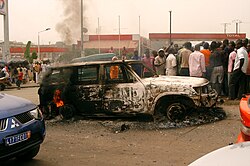UN Security Council Resolution 1975
|
UN Security
Council Resolution 1975 |
|
|---|---|
| Date: | March 30, 2011 |
| Meeting: | 6508 |
| Identifier: | S / RES / 1975 ( document ) |
|
|
|
| Poll: | Pro: 15 Ent. : 0 Cons: 0 |
| Object: | Situation in Ivory Coast |
| Result: | accepted |
|
|
|
| Composition of the Security Council 2011: | |
| Permanent members: | |
| Non-permanent members: | |
|
|
|
|
|
|
|
|
|

|
|
| A UN vehicle set on fire by youths at an intersection in Riviera II, Abidjan (January 13, 2011) | |
The United Nations Security Council Resolution 1975 is a resolution that the United Nations Security Council voted unanimously on March 30, 2011th She deals with the situation in the government crisis in Ivory Coast 2010/2011 .
content
Specifically, the decision was directed against the former Ivorian President Laurent Gbagbo , his wife Simone , the General Secretary of the Presidency Désiré Tagro , the chairman of the Front Populaire Ivoirien Pascal Affi N'Guessan , and against the close Gbagbo advisor Alcide Djédjé . They have been banned from traveling and their assets should be blocked. It was agreed that these sanctions could only be averted through the immediate resignation of Laurent Gbagbos. In addition, the UN troops in Ivory Coast (ONUCI) were promised the full support of the Security Council and an end to violence against the civilian population was demanded. In addition, resolution 1975 formulated the ONUCI's mandate more robustly, at the request of the French government. For example, the wording used in earlier resolutions for the protection of the civilian population was allowed to use “ all necessary means ”, but was replaced by the explicit mention that the ONUCI was authorized to intervene in the use of heavy weapons against the civilian population.
According to Resolution 1975, the use of heavy weapons in the urban area was also explicitly prohibited.
Resolution 1975 was introduced by Nigeria and France .
motivation
The French government stated that the ONUCI's “more robust” mandate, as formulated in Resolution 1975, was decided for various reasons: For example, the suspicion should not arise that the Ivory Coast was not being granted the same protection as Libya in Resolution 1973 on the civil war in Libya ( 2011) . In addition, the credibility of the ONUCI should be strengthened and ultimately, and most importantly, it was tightened to prevent a development like the one in the genocide in Rwanda .
Web links
- United Nations Security Council: Resolution 1975 (2011). (pdf) In: UNO. March 30, 2011, accessed April 4, 2011 (the resolution in full).
- Karl Grobe : The unequal wars. Editorial on the conduct of the UN. In: Frankfurter Rundschau . April 5, 2011, accessed April 6, 2011 (comparison of Resolution 1975 and Resolution 1973 on the civil war in Libya).
Individual evidence
- ↑ a b UN decide on sanctions against Gbagbo. In: Frankfurter Allgemeine Zeitung . March 31, 2011, accessed April 5, 2011 .
- ↑ UN resolves sanctions against Gbagbo ( Memento from April 6, 2011 in the Internet Archive )
- ↑ Travel bans and account freezes. In: ORF . April 1, 2011, accessed April 5, 2011 .
- ^ A b Michaela Wiegel: Protect the French, protect interests. In: Frankfurter Allgemeine Zeitung. April 5, 2011, accessed April 12, 2011 .
- ↑ Thomas Scheen, Mbabane and Michaela Wiegel: Gbagbo arrested in Abidjan. In: Frankfurter Allgemeine Zeitung. April 11, 2011, accessed April 19, 2011 .
